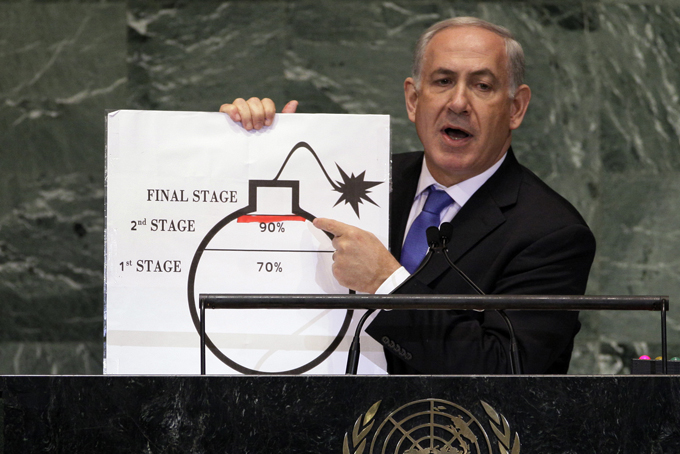In this Sept. 27, 2012, file photo, Prime Minister Benjamin Netanyahu of Israel shows an illustration as he describes his concerns over Iran’s nuclear ambitions during his address to the 67th session of the United Nations General Assembly at U.N. headquarters. (AP Photo/Richard Drew, File)
Israel recently bombed Iran’s military and nuclear facilities, killing Iran’s top military commanders and nuclear scientists. After the air strikes, Israel’s Prime Minister Benjamin Netanyahu stated that the operation was ordered because Israeli intelligence determined Iran was on the verge of developing nuclear weapons.
Netanyahu’s international critics doubted the Iranian nuclear threat to Israel, comparing it to George W. Bush’s false claim about weapons of mass destruction in Iraq.
On The Daily Show, comedian Jon Stewart ridiculed Netanyahu by playing previous videos of him claiming Iran was close to obtaining nuclear weapons. In a 2012 video, Netanyahu stated, “By next spring Iran will move onto the final stage of creating a nuclear weapon.” In a 2015 video clip, Netanyahu warned that “Iran is weeks away from having an entire arsenal of nuclear bombs.” Finally, Steward presented Netanyahu’s televised statement from 2018, in which he claimed to have top-secret documents revealing Iran’s hidden nuclear weapons program.
Steward’s point was that Netanyahu was mistaken in the past, and he is not telling the truth now.
Netanyahu’s detractors asked why Israel didn’t destroy Iran’s nuclear program after Netanyahu’s previous warnings if Iran was actually developing weapons. Netanyahu’s detractors are convinced Israel’s non-action proved that Iran’s officials accurately claimed that Iran’s nuclear program was only for peaceful energy purposes and not weapons.
But it’s ahistorical to think that Israel did not respond to the Iranian nuclear threat until now.
Vinod Janardhanan, a journalist for WION, an Indian English-language news channel, reported that between 2007 and 2025, Israel targeted Iran’s nuclear sites at least 12 times. These attacks included cyberattacks and drone strikes. The attacks helped delay Iran’s nuclear enrichment but could not completely stop it.
What has changed for Israel to now try to stop Iran’s nuclear plans, given that Israel has previously only delayed them?
The answer is the strength of Iran’s proxy Hezbollah.
Hezbollah is a hardline Islamist political and paramilitary organization founded in the early 1980s and dedicated to the theology of Ayatollah Khomeini, the leader of the 1979 Iranian revolution. Hezbollah is headquartered in Lebanon, which lies on Israel’s northern border. The objectives of Hezbollah, according to its 1985 manifesto, are to build an Islamic government in Lebanon based on Iran’s political ideology, to eliminate Western influence from the area, and to destroy Israel.
One Israeli commentator said Hezbollah in Lebanon is Israel’s version of the Cuban missile crisis faced by the United States in the 1960s. Prior to placing missiles in Cuba, the Soviets could only launch missiles at the United States from within the Soviet Union. However, the United States had missiles stationed in Italy and Turkey, giving the U.S. a first-strike advantage if the two superpowers went to war. To balance first strike capabilities, the Soviet Union stationed missiles in Cuba.
In other words, Israel did not rush into a direct conflict with Iran because of Iran’s first-strike capability through its proxy Hezbollah.
It’s worth noting that Gaza’s political leadership, Hamas, is also an Iranian proxy. On October 7, 2023, Hamas invaded Israel, murdering over 1,000 Israelis and taking over 200 hostages. The following day, Hezbollah launched missiles into Israel from Lebanon, displacing tens of thousands of residents from Northern Israel. Hezbollah coordinated its rocket launch to coincide with Hamas’s assault, and Hezbollah said that it will not cease fire until the Gaza war ends.
The term “Gaza War” is a misnomer. Iran waged a proxy war against Israel. As the conflict in Gaza continued into the following year, Israel launched an airstrike on a Syrian consulate, killing two Iranian generals. It was suspected that the Iranian generals were assisting Hamas and Hezbollah from that strategic position.
Iran responded by launching missiles from Iran into Israel. Because Israel intercepted 99 percent of the Iranian missiles, the world did not consider it a major offensive, yet Iran’s direct attack on Israel was unprecedented. Why would Iran carry out such an attack if they had never attempted it before? Iran understood that Israel couldn’t retaliate because it was bogged down in battles against their proxies.
Israel eventually decimated Hamas and Hezbollah.
According to the Times of Israel, in November 2024, Netanyahu ordered the elimination of Iran’s nuclear program after it became clear that Iran would quickly attempt to develop a nuclear weapon once its proxy forces were incapacitated.
The absence of Iran’s first strike capabilities presented Israel with an unparalleled opportunity to conduct a preemptive strike against Iran’s nuclear program. Iran had fired missiles into Israel when it thought Israel couldn’t respond, and Israel’s recent war effort is no different.
The difference could be that Netanyahu is more of a student of Catholic Bishop Fulton J. Sheen than the Iranian Ayatollah. Sheen once stated, “Patience is power. Patience is not an absence of action; rather, it is timing. It waits for the right time to act.”




